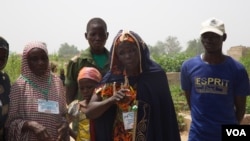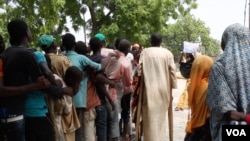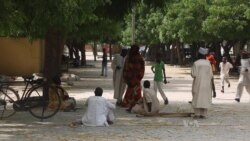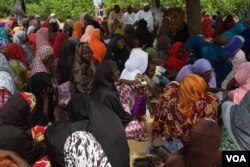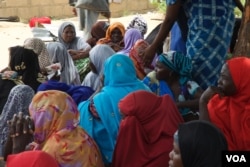Yamirai Hawa walks along a sidewalk behind some street sellers at a busy road intersection in Maiduguri. She passes by a few elderly men lying on the concrete in the shade. She gives them a small piece of paper.
A woman with a handicapped leg slowly makes her way to Hawa. The woman raises her arms and cups her hands and Hawa places a piece of paper in her hand.
Then dozens of children and teenagers wearing tattered clothing run up to Hawa to see what she is passing out.
“This will allow you to come to my house in Moranti side to get food for up to six months,” Hawa tells them, describing the neighborhood in Maiduguri where she lives.
They thrust their hands in Hawa’s face hoping to get a piece of paper.
The paper is a laminated card that serves as a voucher for free food. Hawa walks around Maiduguri handing them out. In a city where many people are experiencing hunger, her presence usually stirs a lot of excitement. Hawa has made it her mission to help people displaced and impoverished by the Boko Haram conflict.
God's work
Hawa is not a rich woman. She was born and raised in Maiduguri. She is petite and one of her eyes is halfway shut. The other is milky gray from a cataract. She wears modest clothing. Despite her average appearance, Hawa is well-respected by the poorest people in the community. She says she is only doing the work of God.
“I’m suffering for people that need help. I sell plots of my father’s land and I use the money to help these people who were suffering by Boko Haram,” Hawa says.
More than one million people have flocked to Maiduguri, the capital of the northeastern Nigerian state of Borno, to escape from Boko Haram’s violence. The Islamist sect has killed an estimated 20,000 in its seven-year insurgency against the Nigerian government.
The conflict has led to a humanitarian crisis. The violence has disrupted farming as Boko Haram members destroyed produce and families are too afraid to return to their communities to farm. In Maiduguri, the signs of hunger are not hard to detect.
Hawa lost her husband in 2014. He went missing one day. She suspects he was killed by Boko Haram.
These days, she says, she’s running out of land to sell, so she’s forced to go to rich people and ask them for money. She uses the money to buy food, distribute clothes and print food vouchers.
“She always gives me food to eat. Nobody else is helping us. Hajia Hawa is our father, mother, everything for us,” says Falmata Mustapha. She’s sitting inside her tailoring shop with the brand new sewing machine that Hawa gave to her.
Back at home, hundreds of people are waiting for Hawa. Today, they will eat yam and soup. Street beggars contribute their earnings to this communal effort, with Hawa as their leader.
Sticking together
Her work has grown during the past five years. She has a roster of nearly 6,000 people who depend on her. She says she too is a beggar. She does not get help from the government.
“Even now, if I tell these people to leave me, they cannot leave me. We have been together for a long time. We love each other. No matter how we suffer, we will still stay together,” Hawa says.
Hawa was arrested once by police officers who she says were suspicious about her source of income.
“They were thinking maybe Boko Haram is giving me money and that I am buying the favor of the people so they will support Boko Haram,” she says . The police officers took her to the station and kept her there for three days. Her supporters, the thousands of displaced people she assists, came to the station to demand her release.
Hawa has become an icon in her community. She wakes up every morning to see more people entering her compound, hoping to find some sort of relief.
“They are all needy. Some women here lost their husbands. Some are the children that lost their parents. We are here suffering. Some will beg, some will not beg, some will help me to work.”
Her home is a small one-story brick house where she sleeps with her daughters. There is another brick building with two bedrooms where some of the IDPs sleep. She is building more buildings where more IDPs can sleep.
There is a large tree in the front yard. About 100 women and a few dozen men sit on mats underneath the tree. Hawa speaks to them about why they must stick together to help each other survive.
One old man comes forward, faces Hawa and says, “We support you 100 percent", he says. "Powerful men have neglected us and you have come to our aid.”




